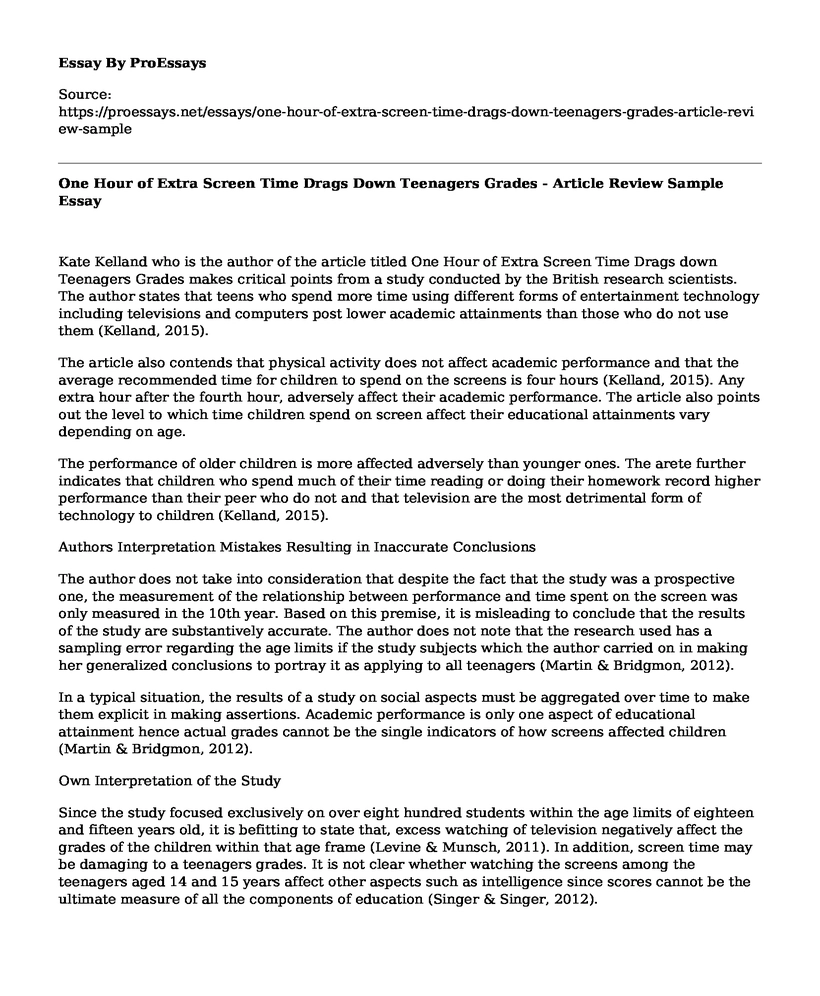Kate Kelland who is the author of the article titled One Hour of Extra Screen Time Drags down Teenagers Grades makes critical points from a study conducted by the British research scientists. The author states that teens who spend more time using different forms of entertainment technology including televisions and computers post lower academic attainments than those who do not use them (Kelland, 2015).
The article also contends that physical activity does not affect academic performance and that the average recommended time for children to spend on the screens is four hours (Kelland, 2015). Any extra hour after the fourth hour, adversely affect their academic performance. The article also points out the level to which time children spend on screen affect their educational attainments vary depending on age.
The performance of older children is more affected adversely than younger ones. The arete further indicates that children who spend much of their time reading or doing their homework record higher performance than their peer who do not and that television are the most detrimental form of technology to children (Kelland, 2015).
Authors Interpretation Mistakes Resulting in Inaccurate Conclusions
The author does not take into consideration that despite the fact that the study was a prospective one, the measurement of the relationship between performance and time spent on the screen was only measured in the 10th year. Based on this premise, it is misleading to conclude that the results of the study are substantively accurate. The author does not note that the research used has a sampling error regarding the age limits if the study subjects which the author carried on in making her generalized conclusions to portray it as applying to all teenagers (Martin & Bridgmon, 2012).
In a typical situation, the results of a study on social aspects must be aggregated over time to make them explicit in making assertions. Academic performance is only one aspect of educational attainment hence actual grades cannot be the single indicators of how screens affected children (Martin & Bridgmon, 2012).
Own Interpretation of the Study
Since the study focused exclusively on over eight hundred students within the age limits of eighteen and fifteen years old, it is befitting to state that, excess watching of television negatively affect the grades of the children within that age frame (Levine & Munsch, 2011). In addition, screen time may be damaging to a teenagers grades. It is not clear whether watching the screens among the teenagers aged 14 and 15 years affect other aspects such as intelligence since scores cannot be the ultimate measure of all the components of education (Singer & Singer, 2012).
References
Martin, W. E., & Bridgmon, K. D. (2012). Quantitative and statistical research methods: From hypothesis to results. San Francisco: Jossey-Bass.
Kelland Kate (2015 Sept 4). One Hour Of Extra Screen Time Drags Down Teenagers' Grades. (2017). Huffington Post. Retrieved 11 June 2017, from http://www.huffingtonpost.com/entry/one-hour-of-extra-screen-time-drags-down-teenagers-grades_us_55e99448e4b03784e2758b2a
Levine, L. E., & Munsch, J. (2011). Child development: An active learning approach. Thousand Oaks, Calif: SAGE.
Singer, D. G., & Singer, J. L. (2012). Handbook of children and the media. Los Angeles: Sage.
Cite this page
One Hour of Extra Screen Time Drags Down Teenagers Grades - Article Review Sample. (2021, Jun 26). Retrieved from https://proessays.net/essays/one-hour-of-extra-screen-time-drags-down-teenagers-grades-article-review-sample
If you are the original author of this essay and no longer wish to have it published on the ProEssays website, please click below to request its removal:
- The Manual to Success Essay
- Critical Thinking: Stop and Frisk
- Essay Sample on Freedom In Speech
- Music: Enhancing Lives and Educations of Students - Essay Sample
- Essay Sample on Evaluating Effects of State Takeover on Teachers & Students
- Essay Example on the Power of Speech: Communicating to Mass Audiences Throughout History
- Movie Analysis Essay on Goodfellas







